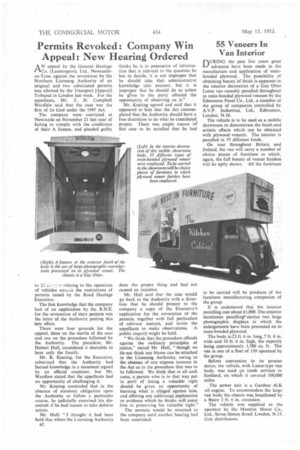Permits Revoked: Company Wm Appeal: New Hearing Ordered
Page 36

If you've noticed an error in this article please click here to report it so we can fix it.
AN appeal by the General Haulage Co. (Leamington), Ltd., Newcastleon-Tyne, against the revocation by the Northern Licensing Authority of an original and two substituted permits was allowed by the Transport [Appeal] Tribunal in London last week. For the appellants, Mr. T. H. Campbell Wardliw said that the case was the first of its kind under the 1947 Act.
The company were convicted at Newcastle on November 21 last year of failing to comply with the conditions of their A licence, and pleaded guilty to 23 relating to the operation of vehicles ouis.,:e the restrictions of permits issued by the Road Haulage Executive.
The first knowledge that the company had of an application by the R.H.E. for the revocation of their permits was the letter of the Authority putting this into effect.
There were four grounds for the appeal, three on the merits of the case and one on the procedure followed by the Authority. The president, Mr: Hubert Hull, considered it desirable to hear only the fourth.
Mr. R. Keating, for the Executive, submitted that the Authority had factual knowledge in a statement signed by an official examiner, but Mr. Wardlaw stated that the appellants had no opportunity of challenging it.
Mr. Keating contended that in the absence of statutory obligation upon the Authority to follow a particular course, he judicially exercised his diseretio6 if he had reason to take definite action.
Mr. Hull: "I thought it had been held that where the Licensing Authority B2 thinks he is in possession of information that is relevant to the question he has to decide, it is not improper that he should take that administrative knowledge into account, but it is improper that he should do so unless he gives to the party affected the opportunity of observing on it."
Mr. Keating agreed and said that it appeared to him that the Act contemplated that the Authority should have a free discretion to do what he considered proper. There was ample reason in` this case to be satisfied that he had done the proper thing and had not caused an injustice.
Mr. Hull said that the case would go back to the Authority with a direction that he should present to the company a copy of the Executive's application for the revocation of the permits, together with full particulars of relevant matters, and invite the appellants to make observations. A public inquiry might be held.
"We think that the procedure offends against the ordinary principles of justice," stated Mr. Hull, "though we do-not think any blame can be attached to the Licensing Authority, owing to the absence of any express instance in the Act as to the procedure that was to be followed. We think that in all such cases, a person who is in that way put in peril of losing a valuable right should be given an opportunity of learning what is alleged against him, and offering any additional explanation or evidence which he thinks will assist him in preserving his valuable right."
The permits would be returned to the company until another hearing had been concluded.




























































































